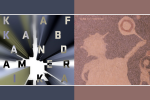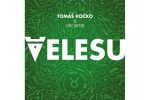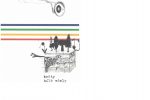For the 30th birthday of record label Indies Scope, Brno Daily looks back at the history of this icon of the Brno music scene, revisiting a selection of the most significant releases from the label’s back catalogue. We are presenting one album every week, with commentary from co-founder Milan Páleš, who started the label with Miloš Gruber in 1990. Image: Courtesy of Indies Scope.
Continuing our retrospective series on key releases from the iconic Brno record label Indies Scope, Brno Daily is today going back to 2013…
The Context in 2013
In 2013, one of the emerging streaming apps, Swedish-based Spotify, made its service available on web and browser apps. The number of users would quickly grow from 50 million to hundreds of millions.
The consumption of music as it was before, with full-album listening sessions, is already long gone, and releasing a single a week is becoming the standard for many artists, on the hunt for streaming clicks and worldwide web fame.
Famous names such as Daft Punk (“Random Access Memories”), Kanye West (“Yeezus”) and Justin Timberlake (“The 20/20 Experience”) are all releasing their most successful albums to date.
David Bowie (“The Next Day”), Arctic Monkeys and Pearl Jam, are also releasing LPs this year.
Continuing the trend of female-fronted new stars, Scotland’s Chvrches get some recognition for their debut, “The Bones of What You Believe” and 17-year-old New Zealander Lorde, with her debut album “Pure Heroine”, becomes an overnight worldwide phenomenon, entering directly at #3 on the US Billboard charts.
Meanwhile at Indies Scope
Artist: KVĚTY
Album: Bílé včely
After a year, the Brno perennial flowers Květy blossomed again, this time loudly and without any ornamental leaves. This time, Květy chose a slightly different approach, recording the album with just four people, intentionally without any guests, with emphasis on the rawness and authenticity. “There was a need for different concept. Only the energy of the four of us. And then I felt that it would be best if I sang all those songs by myself, because I know what they are about” said singer Martin E. Kyšperský.
“Bílé včely” was recorded with the sound engineer and producer Ondřej Ježek in the summer of 2012 in Prague. Ježek’s influence is reflected in the final recording, in mostly electronic sounds. “He added different echoes, odd sounds, squeaks and totally sweet-sounding echoes. He created it out of sound fragments of our own recordings. Ghosts in the machine,” said Kyšperský. At some moments, the band sounds really dirty, but always with tenderness.
Kyšperský is the sole author of music and lyrics: “One song was written based on a weird dream, another one was recorded, then played backwards and then we added vocals. Calculator, baby cashier, hand spin-dryer and old voice recorder with almost completely flat batteries. Long lost classmates, old and tired people that nobody wants to listen to, forest, bad shepherds who offer false consolation…” This is the world according to Martin E. Kyšperský, extraordinary, fascinating and worthy of recording.
Milan Páleš remembers
Another Brno band with whom we have been collaborating since they were in diapers, since the first album. The band had got to the point of being the best alternative rock band in Brno, and the album “Bílé včely” in 2013 only confirmed this position. The album “Myjau” had already featured several beautiful melodic songs, and Martin Kyšperský proved to be a skillful and capable musician with a feeling for melody and great arrangements. The songs “My děti ze stanice Bullerbyn” and “Kopýtka” will forever be among the band’s golden hits. This year, the band is celebrating 20 years of existence, and is releasing a new album, but unfortunately without a violinist and bass player.
Brno Daily reviews
12 songs with an average length of 3:30 compose this LP.
A good mix of pop rock attitude, with mostly classic structure, light guitar, drums, and some folk arrangements (“Kámoši”).
The vocals are executed with a voice on the string of instrumental melodies, some echoes, and sometimes more explosive chorus and chorus extension (“Lesní duch”).
There is the impression of controlled disorder emanating from some songs, with faster rhythms and a slight hint of improvisation (“Kostra” or “A. Kurosawa”).
Here, understanding the lyrics is probably really important, with the storytelling of the full LP depending on that omnipresence of the vocals and their own variation on tracks such as “Na útěku”.
The album concludes with “Marko Polo”, where the vocalist is almost alone at the beginning, joined by a collective chorus (more male voices), showing the appeal of guest contributors, especially for live gigs.
You can stream this album here or find out more at Indies Scope.
More from this series:











